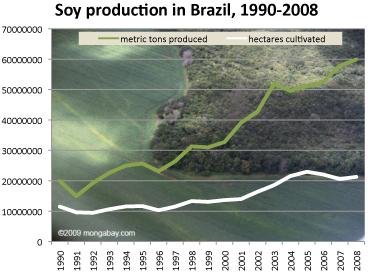A new study commissioned by major soy traders has revealed that nearly all farmers blocked by Brazil’s longstanding “Soy Moratorium” engaged in illegal land clearing. The findings, reported by Reuters, highlight persistent challenges in addressing deforestation linked to soy production in the Amazon rainforest. The Soy Moratorium, established over a decade ago as a critical environmental safeguard, prohibits the purchase of soy grown on recently deforested land. However, this latest research suggests widespread non-compliance among producers flagged under the agreement, raising questions about the effectiveness of current enforcement measures and the broader impact of soy cultivation on Brazil’s vital ecosystems.
Farmers Cleared Land Illegally Despite Soy Moratorium Restrictions
A recent examination by an independent traders’ consortium reveals that a staggering majority of farmers-over 90%-subject to Brazil’s ‘Soy Moratorium’ have nonetheless engaged in illegal land clearing activities. The study highlights that despite longstanding restrictions aimed at reducing deforestation in critical Amazonian ecosystems, enforcement loopholes and limited ground monitoring have allowed extensive unauthorized land conversions. Such actions directly undermine the environmental objectives of the moratorium, raising concerns over the effectiveness of existing regulatory frameworks.
The analysis further breaks down the illegal clearing activities by region and farming scale, emphasizing the complexity of achieving compliance. Notably, smaller-scale farmers represented a significant proportion of offenders, challenging assumptions that large agribusinesses are solely responsible. The study recommends a combination of stronger satellite surveillance, targeted inspections, and more rigorous supply chain transparency measures to mitigate illicit land use and promote sustainable soy production.
- Illegal Clearing Rate: 92% of monitored farms
- Regions Most Affected: Mato Grosso, Pará, Rondônia
- Primary Violation: Conversion of protected forest areas
| Region | Illegal Clearings (ha) | Farm Size | Compliance % |
|---|---|---|---|
| Mato Grosso | 12,500 | Large | 8% |
| Pará | 9,800 | Small to Medium | 12% |
| RondĂ´nia | 7,300 | Mixed | 10% |
Traders Highlight Gaps in Enforcement Undermining Deforestation Controls
New findings from traders’ research expose critical loopholes in the enforcement of Brazil’s deforestation laws, particularly relating to the “Soy Moratorium.” Despite its intent to prevent soy sourced from recently deforested lands, the study reveals that nearly all farmers blocked by the moratorium engaged in illegal land clearing prior to being restricted. This glaring weakness not only undermines the initiative’s credibility but also highlights the challenges regulators face in tracing and verifying land-use compliance amid vast Amazonian frontiers.
The investigation underscores a complex dynamic where enforcement agencies struggle with:
- Delayed satellite monitoring and reporting, allowing illicit clearings to go unnoticed for months.
- Insufficient ground verification, leading to incomplete records of illegal deforestation.
- Fragmented cooperation between governmental bodies and commodity traders.
As a result, crucial supply chains remain vulnerable to contamination from illicit deforestation, calling for urgent reforms to strengthen transparency and accountability in Brazil’s agricultural sector.
| Issue | Impact | Proposed Solution |
|---|---|---|
| Late detection of illegal clearings | Delayed enforcement actions | Real-time satellite monitoring |
| Low ground verification rates | Unverified moratorium compliance | Increased field audits |
| Trader-government collaboration gaps | Weak supply chain oversight | Enhanced data sharing platforms |
Experts Call for Strengthened Monitoring and Stricter Compliance Measures
In light of the recent findings revealing that nearly all farmers affected by Brazil’s Soy Moratorium have engaged in illegal land clearance, environmental experts are urging for a comprehensive overhaul of existing surveillance mechanisms. Current monitoring systems, many relying on satellite imagery and self-reporting, have proven insufficient in accurately tracking land use changes, especially in remote regions. Experts emphasize that enhanced technological integration, including real-time data analytics and AI-powered deforestation alerts, should be prioritized to detect violations swiftly and with greater precision.
Moreover, stricter enforcement policies are considered critical to curb ongoing environmental degradation. The emphasis is on:
- Imposing heavier penalties for non-compliance to deter illegal deforestation
- Mandating transparent reporting standards among traders and farmers
- Increasing funding for on-the-ground inspections and community reporting initiatives
- Developing cross-sector partnerships to improve oversight across the supply chain
| Measure | Current Status | Recommended Improvement |
|---|---|---|
| Satellite Monitoring | Monthly Updates | Near Real-Time Alerts |
| Penalties | Light Fines | Substantial Monetary & Legal Sanctions |
| Field Inspections | Occasional | Regular and Randomized Checks |
In Conclusion
The findings of the traders’ study shed new light on the widespread disregard for environmental regulations within Brazil’s soy industry, raising critical questions about the effectiveness and enforcement of the Soy Moratorium. As pressure mounts on both producers and buyers to ensure deforestation-free supply chains, stakeholders will need to reconcile economic interests with sustainability commitments. The evolving debate underscores the ongoing challenges in balancing agricultural expansion with environmental conservation in one of the world’s most ecologically sensitive regions.




